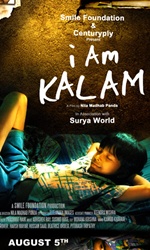|
|

|
|


EDITOR'S PICK
Rating: ****
The boy is a dreamer. One look at the former President of India A.P.J. Abdul
Kalam on television and Chotu decides to call himself Kalam. Kalam believes
every child has the right to education.
Without the least display of pity or preachiness, debutant director Nila Madab
Panda creates a world of infinite hope and minuscule joys for his precocious
unlettered but smart protagonist Chotu.
The wispy but firm-handed narration weaves through Chotu`s relationships with
various characters in his life… his uncle, the dhaba owner Bhatti, which is
played with endearing warmth by Gulshan Grover, the jealous Bachchan-crazy
recruit at the dhaba Laptan (Pitobash, natural in his unsophisticated meanness),
the free-spirited French tourist Lucy (Betarice ordeix), and above all, Chotu`s
rapport with the Rajasthani royalty Ranvijay Singh (Husaan Saad), a kind lonely
aristocrat boy who eagerly befriends Chotu to share his luxurious but solitary
life with.
The shared moments between Chotu and his motley crew of compelling characters
are tender and genuine. The characters are never slotted or allowed to become
stereotypical. They convey a kind of free-flowing casualness that makes them
real and yet dramatic in a subtle way.
The film`s social message of education-for-all is underlined but never
italicized. It`s left to the boy protagonist Harsh Mayar to bring out the
theme`s inherent message without making the plot heavy or didactic.
Mayar with his unassuming swagger and artless smile brings to the film a rare
intelligence and humour. National award, did they say? The boy deserves much
more.
The first-time director tends to over-simplify the complexities of the plot
towards the end when in a quest for a flashy climax he collects all the
characters at an extremely manufactured crisis point.
But the clumsiness of some episodes doesn`t take away from the film`s intrinsic
warmth and gentleness. The narration glides through Chotu-Kalam`s adventures
with ease and fluency creating the fantasy-driven hopeless world of an
underprivileged child without pity of sentimentality.
The last shot shows the `prince` and the `pauper` traveling happily together in
the same school bus. Socialism has arrived. Abdul Kalam must be smiling at this
Utopian dream of finale. But then isn`t that what cinema does? Offer hope,
create a dream world and exchange the harsh reality of the outside world with a
magical alternative.
I Am Kalam does all of this. Must be watched for its sincere effort
to carry forward the world of the child with the same mellow maturity of vision
as the recent Stanley Ka Dabba and Chillar Party.
Hi I am Kalam!
I come from a small village in Rajasthan, I live
there with my mother and little brother. Life here is very difficult.
Getting proper meal is a rarity so going to school is just out of
question. But I like reading, learning new things and making new friends.
When I grow up, I want to be a big man, wear good clothes and a tie and
become successful.
Mother says that my brain works “Rail se bhi tez”. To help my mother
support the family I work with Bhati Mamu at his dhaba. He has a camel,
Laxmi. I am her best friend. Tourists from various countries stop at our
dhaba. I like talking to them and learning their languages.
APJ Kalam ji is my role model. I am his most obedient student. I know that
I can become like him if I go to school.
I hate it when people call me Chhotu; because I
AM KALAM.